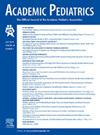通过参加居民公共演讲课程纵向提高公共演讲技能。
IF 3
3区 医学
Q1 PEDIATRICS
引用次数: 0
摘要
目的为了提高公共演讲技能,儿科住院医师培训项目开发了一套以刻意练习和反思练习为基础的纵向公共演讲课程:方法:住院医师进行年度演讲并获得正式反馈。2005-2017年的听众评估表被纳入分析范围。该表格针对具体的演讲要素(清晰度、眼神交流/肢体语言、节奏、简洁的文字、尽量不分散注意力的表达、清晰的结论、适当的学习目标、实现学习目标和回答问题)和整体质量采用了 5 分制(5 分=最佳)。得分的纵向变化通过配对 t 检验进行分析:结果:共分析了 97 名住院医师对 276 场演讲进行的 5771 次评价。在研究生 1 年级(PGY)和研究生 3 年级(PGY-3)的演讲中,平均总评分从 4.38 分上升到 4.59 分(PConclusions:儿科住院医师参加了具有针对性目标、正式反馈和反复练习的公开演讲课程后,他们的公开演讲技能得到了提高。公开演讲课程可以而且应该在医学研究生教育中更广泛地采用。本文章由计算机程序翻译,如有差异,请以英文原文为准。
Longitudinal Improvement in Public Speaking Skills Through Participation in a Resident Public Speaking Curriculum
Objective
To promote public speaking skills, a pediatrics residency program developed a longitudinal public speaking curriculum grounded in deliberate practice and reflective practice.
Methods
Residents delivered annual presentations and received formal feedback. Audience evaluation forms from 2005 to 2017 were included for analysis. The form used five-point scales (5 = best) for specific presentation elements (clarity, eye contact/body language, pace, succinct text, minimally distracting delivery, clear conclusion, appropriate learning objectives, achieving learning objectives, and answering questions) and for overall quality. Longitudinal changes in scores were analyzed with paired t tests.
Results
Overall, 5771 evaluations of 276 presentations given by 97 residents were analyzed. Between post-graduate year (PGY)-1 and PGY-3 presentations, mean overall rating increased from 4.38 to 4.59 (P < .001, d = 0.51). The median percentage of five-point scores increased from 50.0% (IQR, 24.3%−65.4%) to 72.5% (IQR, 53.3%−81.2%). Eight of nine specific elements showed significant increases (median effect size 0.55). Residents whose initial presentations ranked in the bottom quartile had larger improvements than residents initially ranked in the top quartile.
Conclusions
After pediatric residents participated in a public speaking curriculum with targeted objectives, formal feedback, and repeated practice, their public speaking skills improved. Public speaking curricula can and should be adopted more broadly in graduate medical education.
求助全文
通过发布文献求助,成功后即可免费获取论文全文。
去求助
来源期刊

Academic Pediatrics
PEDIATRICS-
CiteScore
4.60
自引率
12.90%
发文量
300
审稿时长
60 days
期刊介绍:
Academic Pediatrics, the official journal of the Academic Pediatric Association, is a peer-reviewed publication whose purpose is to strengthen the research and educational base of academic general pediatrics. The journal provides leadership in pediatric education, research, patient care and advocacy. Content areas include pediatric education, emergency medicine, injury, abuse, behavioral pediatrics, holistic medicine, child health services and health policy,and the environment. The journal provides an active forum for the presentation of pediatric educational research in diverse settings, involving medical students, residents, fellows, and practicing professionals. The journal also emphasizes important research relating to the quality of child health care, health care policy, and the organization of child health services. It also includes systematic reviews of primary care interventions and important methodologic papers to aid research in child health and education.
 求助内容:
求助内容: 应助结果提醒方式:
应助结果提醒方式:


